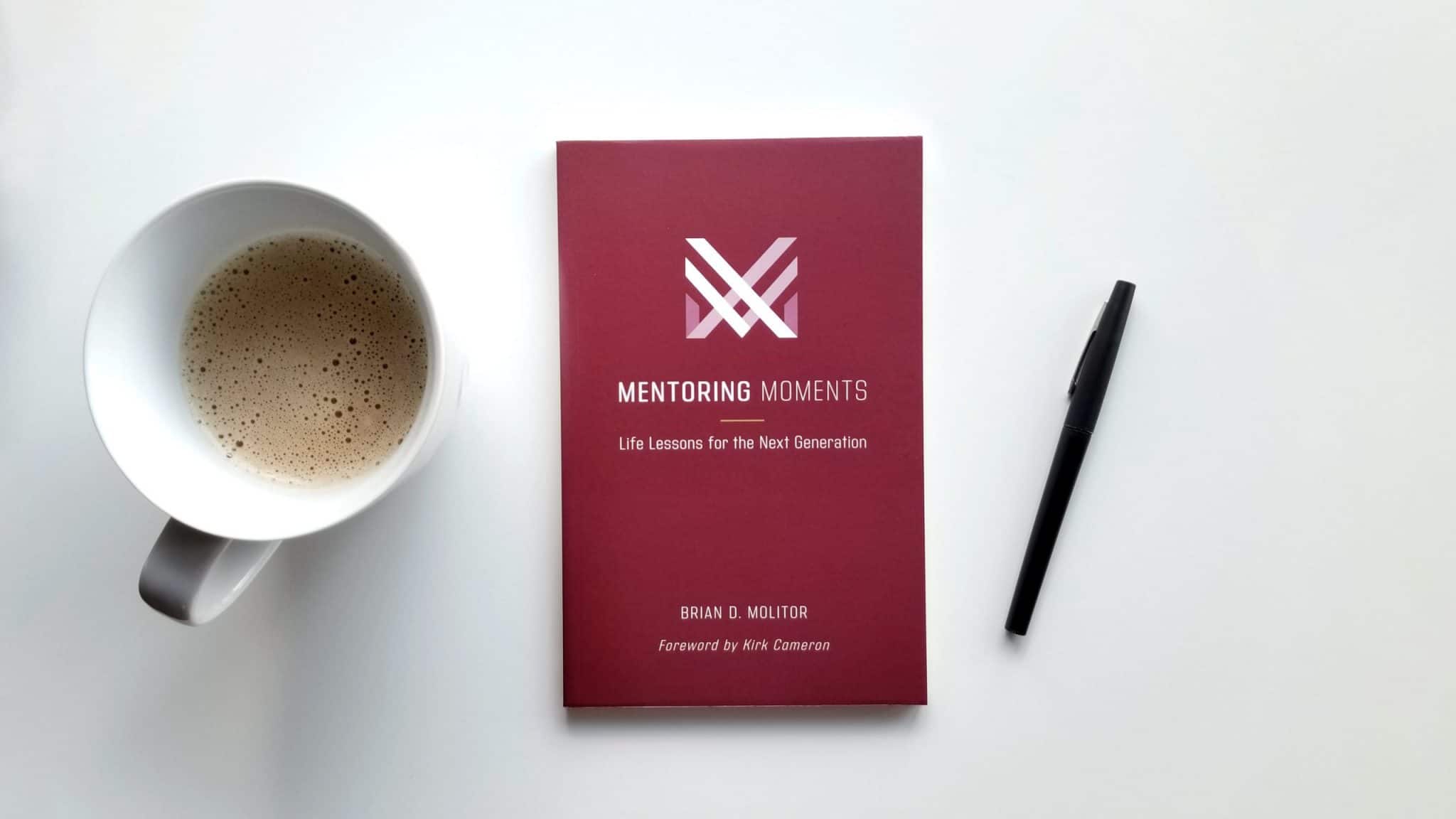This post comes from a webinar featuring Brian Molitor in which he shared with our friends at National House of Hope vital advice on mentoring young people. Watch this webinar on YouTube here or listen on our podcast here.
Jesus taught his disciples—more than that, he mentored them. Jesus walked alongside those he mentored, explaining and modeling examples of how to live. He spent time with them, talked with them, ate with them, prayed with them, and shared in the ups and downs of life with them.
Today, it is more important than ever to raise up our young people into healthy values, habits, and ways of encountering the challenges of life that are sure to come. It is the responsibility of those who have walked through challenges to pass along their wisdom and experience to others, and it is our responsibility as Christian adults and leaders to ensure the intentional teaching, training, and mentoring of young people.
Keep in mind that sitting down with a young person to teach them a lesson does not take the place of walking alongside them through life, but it does establish foundational truths that young people can take into their hearts and minds to guide them and build them up throughout their lives.
It is walking alongside someone that shows how deeply we care and how intently we are invested in their life.
Mentoring moments matter because such moments show the love of Jesus to others in a way that can shape them, encourage them, and move them to lead a life of wisdom and love. We have the opportunity to make a difference in the lives of the young people around us. All we need to do is slow down enough to make the investment that pays life-changing dividends.
Learn more about the book Mentoring Moments here.
The Role of Mentoring
So where does the concept of mentoring come from? The concept of mentoring, at least the name of it, first originated in ancient mythology. The story goes like this: A man called Odysseus was heading off into war, and he had a son, Telemachus. The father knew he would be gone for a long while, so he found another man to watch over his son and see to his son’s development and well-being.
The man’s name? Mentor.
It is a sad fact that we have so many young people in today’s society who don’t grow up in a two-parent home—whether because of parental choices or because of tragedy. Sons and daughters, boys and girls, all of us, are created to respond to both a father’s and a mother’s presence in our lives.
We need both kinds of love, discipline, nurturing, play, and more. That is God’s best plan for us, even though it does not always happen that way. This is where mentoring comes in.
Parents should be intentionally and carefully mentoring, teaching, and training their own children. And we must be prepared to step into the gap in other’s lives and build relationships, invest time in teaching, and provide the insights needed for a young person without the ideal home setting to grow into maturity.
Mentoring is essential.
Some may think, What’s the big deal? Remember that mentoring is a big deal because young people have a different mindset than what we might have. Children and teens and young adults see few options, don’t recognize consequences, and have a short-term timeframe.
This is why many young people do things that make no sense to us as adults. That mindset is exactly why young people need someone to come alongside them and mentor them, to be with them and show them how to apply wisdom and utilize discernment when challenges arise.
The Mentoring Process
Imagine the power of someone who comes alongside and spends time with a child, teen, or young adult, someone who prays with them and teaches them how to navigate through life. That time and relationship will change the trajectory of that young person’s life and have a lasting effect on how they see themselves and the world around them. This is the reason we mentor. This is why mentoring should hold a higher importance in our minds and schedules.
The power of mentoring is released through a process, and there are important points to understand for effective mentoring. Here are four keys:
1. Have regular time together.
In today’s society, this can be difficult. We have many, many things happening all the time, and we also have many opportunities for our time to be wasted. You have to purposefully set aside time if you are really going to connect with and mentor a young person. Spending time with that person is a clear way to show that you’re invested in them, that you are truly looking out for them and their best interests, and that you believe they are worth the time and effort.
Being together over time is the only way to build a relationship. So, for a mentor to be effective, a good, solid, healthy, and trusting relationship is absolutely necessary—and that type of relationship only grows over a period of time.
2. Have open communication.
With the access that young people have to information these days, there’s not much they are not being exposed to. The input of a mature adult is vitally important. They need to know that we represent a safe place, a place of gentle, responsible feedback.
Young people are seeking truth and a solid voice of wisdom in their lives. As a mentor, you need to be able to broach subjects with them that they might not discuss with anyone else. You need to be a guiding voice of truth, security, and wisdom for them.
Open communication is the way to ensure that the relationship between a mentor is both lasting and genuine.
3. Create a positive relationship.
As a parent or mentor, you have approximately eighteen years to lay a foundation upon which that young person will build for half a century. This truth helps us understand that “our” children are not truly ours.
While we participated in bringing them to earth, God is the one that actually created them. Children belong to God. They came from God. We are simply stewarding them in the meantime. As stewards with a view to the future, we can never waste time or relational capital by fighting wrong battles with the young people under our care.
Make sure that when you take a stand, it is on values and principles rather than trivial things, such as length of hair or loud music that will have no lasting impact on the young person’s life. A positive relationship between a mentor and trainee results in trust, respect, and opportunities to share wisdom.
4. Predetermine life lessons.
As a parent or mentor, you will either be viewed as mostly positive or mostly negative.
Obviously positive mentoring is what we are all after, so remember that if you don’t have predetermined life lessons—if you don’t really understand what you are looking for in the young person—then when you see those good things happening, you will tend to ignore them. When we see good things, we tend to be silent if we haven’t predetermined that those are the things we’re looking for. However, too often, when a young person does something we don’t like, we are sure to respond.
There is nothing wrong with correcting problematic behavior or mistakes, but without affirming the good when it happens, we become out of balance and negative. What they end up hearing most from us is negative and non-constructive—instead of what they really need which is encouragement and support. Youth need to be affirmed and appreciated for the good things that they do. Affirm them, cheer them on, build them up, and you will see positive change come from the inside out.
Independence, Codependence, Interdependence
You have to understand that the young people under your care will be there for a season, then they are going to leave the nest. Not every young person leaves home in the correct way, and this makes them vulnerable amidst life’s challenges and temptations.
There are three options for a young person leaving home or leaving the care of a non-parental mentor:
-
- Premature independence, which is where a young person feels trapped and smothered, and runs or pulls away.
- Unhealthy codependence, which is where there is supposed to be a lengthening of the cord that ties the young person together with the adult, but instead of lengthening, it becomes an entanglement.
- Healthy interdependence, which is how it’s supposed to be. Healthy interdependence is where the young person grows into a healthy adult that does not depend on adult to live a successful life.
The beauty of healthy interdependence is the generations remain connected through a positive and healthy interconnected relationship. In the same way the parent is not clinging to that young person or holding them back from going out on their own and making their own choices.
God created us to be in healthy relationships with one another and with God. He also created us to grow into as individuals that learn to do things, learn to think, and learn to provide for our basic needs without undue support from others.
There is a beautiful balance here that mentors can help young people understand through connected hearts, inspiriting lessons, and time spent together. The mentoring process ensures that young people will not be left alone to figure things out. When our hearts are connected and invested in others, we are sure to increase in love and care—just as we are called to do.
Laying a Foundation
It is our job to empower the next generation with the tools they need to take on life’s challenges. Along the way, you will want to have some way to guide the young person. So be sure to have some interaction with Scripture.
This picture is a look inside Brian Molitor’s Mentoring Moments, that shows how he integrates Scripture into these mentoring moments.
As mentors, we are teaching them where to find answers. Remember to let the young person share their own thoughts. They need to be able to work through what they are feeling in order to understand it better, as well as see how to put discernment into action.
Letting them talk through things enables them to see that what they have to say matters and that their feelings hold importance. Once they have spoken and worked through some of their thoughts and feelings, that is when you as the mentor have the opportunity to take time and speak wisdom. Because we have experienced life, we have good words to affirm the young person and, at times, correct misconceptions held by the young person.
Mentors have life experience that they can share with young people to prevent them from making predictable mistakes.
There are too many people who are hurting today because they don’t understand how important they are and that there is a reason for them to be here. They don’t realize that there is a way of wisdom, that there is joy to be found in this life.
As mentors, we help them lay a solid, healthy foundation of wisdom that they will build upon for rest of their lives.
Brian Molitor, author of this article, wrote Mentoring Moments—a 52-week devotional for mentors or parents to guide young people—as a tool for parents and other mentors.



